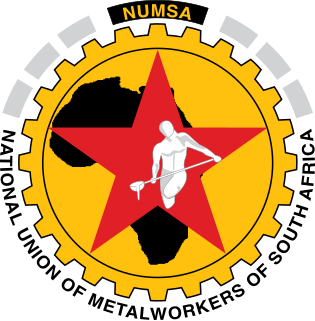
The World Federation of Trade Unions (WFTU) is an international federation of trade unions. WFTU was established in 1945 to replace the International Federation of Trade Unions.

The National Union of Metalworkers of South Africa (NUMSA) is the biggest single trade union in South Africa with more than 338,000 members, and prior to its expulsion on 8 November 2014, the largest affiliate of the Congress of South African Trade Unions (COSATU), the country's largest trade union federation.

The Food and Allied Workers Union (FAWU) is a trade union representing workers in the food processing industry in South Africa.

The Confederation of Shipbuilding and Engineering Unions (CSEU), often known as the Confed is a trade union confederation in the United Kingdom.
Moses Jongizizwe Mayekiso was a South African trade union leader and a leading activist in the struggles against the apartheid regime during the 1980s. He became general secretary of the National Union of Metalworkers of South Africa and an elected member of the South African Parliament.
The Trade Union International of Workers in the Metal Industry was a trade union international affiliated to the World Federation of Trade Unions.
The Metalworkers' Union was a trade union representing workers in the metal industry in Finland.

The National Automobile and Allied Workers' Union (NAAWU) was a trade union representing workers in the motor industry in South Africa.

The Transport and General Workers' Union (TGWU) was a trade union representing transport workers, and at times workers in other sectors, in South Africa.
The Motor Industry Combined Workers' Union (MICWU) was a trade union representing workers in vehicle manufacturing and servicing, and also petrol attendants, in South Africa.

The Paper, Wood and Allied Workers' Union (PWAWU) was a trade union representing workers in various related industries in South Africa.
The Black Allied Workers' Union (BAWU) was a national trade union federation in South Africa.
The Electrical and Allied Workers' Trade Union of South Africa (EAWTUSA) was a trade union representing electricians in South Africa.
The Metal and Electrical Workers' Union of South Africa (MEWUSA) is a trade union representing workers in engineering and related trades in South Africa.
June-Rose Nala is a former South African trade unionist and academic.
The General Workers' Union of South Africa (GWUSA) was a general union in South Africa.
Enoch Godongwana is a South African politician who has been serving as the Minister of Finance of South Africa in the government of President Cyril Ramaphosa since August 2021. He is also the current head of the African National Congress's economic transformation subcommittee in the national executive committee (NEC).
Volkswagen Group is headquartered in Germany with operations in 29 countries across its 120 plants. With 120,000 employees in Germany and 600,000 globally, it is one of the most well organized labour backed companies in the world. The role that Works Councils and IG Metall play is unique even within Germany. Workers at Volkswagen Group, including its marque Volkswagen (VW) have some of the strongest collective agreements. With the exception of the United States and China, all of its major locations are represented in the Global Works Council and local trade union bodies. VW Group has a strong tradition and practice of social partnership and co-determination rights globally.
The 2021 South African metalworkers strike was a workers strike among metalworkers in South Africa represented by the National Union of Metalworkers of South Africa (NUMSA) and the Metal and Electrical Workers' Union of South Africa (MEWUSA). Beginning October 5, 2021, workers represented by NUMSA have been on strike demanding higher pay, specifically requesting an 8% across-the-board wage rise in the first year, and inflation plus 2% for the second and third years. The Steel and Engineering Industries Federation of Southern Africa (SEIFSA), an industry association, had offered 4.4% for 2021, inflation plus 0.5% in 2022 and inflation plus 1% in the third year, which was rejected by NUMSA. On October 21, 2021, NUMSA and SEIFSA agreed to a 6% annual increase for lower-paid employees, and a 5-5.5% increase for higher paid employees. The strike impacted mining, construction, engineering and metallurgical businesses throughout the country, with BMW's production in the country particularly impacted. A representative from SEIFSA suggested that the strike cost businesses a total of 600 million South African rand, and resulted in 300 million rand of lost pay for workers.







